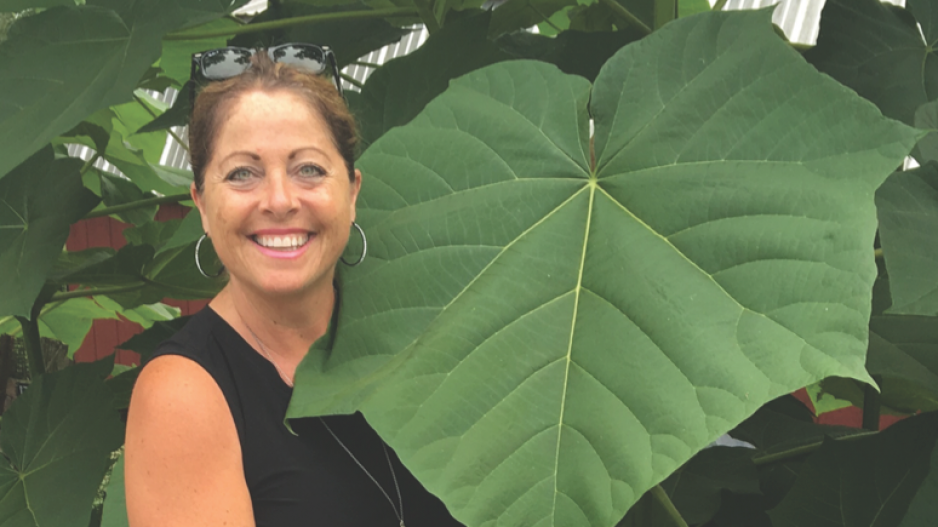For the responsible investor, opportunities come in all shapes, sizes and returns. At the Sustainable Brands Expo in Vancouver, one of those opportunities comes in the form of a giant leaf. Having nothing to do with cannabis, the leaf belongs to the Empress Splendor tree, the fastest-growing tree in the world.
It’s currently attracting attention for its access points as low as $2,500 and a conservative 10 times return.
“We deliberately wanted a low entry for non-accredited investors,” says Cathy Key, COO of the World Tree Carbon Offset Program, which manages the investments.
Grown in groves around the world, the Empress Splendor produces 11 times more oxygen and absorbs 11 times more carbon than the average tree. The lowest investment enables a purchase of one acre of trees, which consumes 1,000 tons of carbon.
As light as balsa wood, but as durable as pine, the Empress grows 10 to 20 feet in the first year and can be harvested within seven to 10 years, generating tens of thousands of board feet – and dollars – per acre.
World Tree is just one example of a solution for people looking to feel better by investing their dollars in social investment, also known as socially responsible investing (SRI), sustainable, socially conscious, “green” or ethical investing.
The trend is growing significantly.
The Responsible Investment Association’s 2016 Canadian RI Trends survey reported that responsible investment (RI) assets had grown by 49 per cent in two years and passed $1.5 trillion in RI assets, representing 38 per cent of the Canadian investment industry. RI mutual funds grew by 24 per cent, reaching over $8 billion in assets.
“Investors are reaching such a point of cynicism that they’re looking for other options,” says Stephen Whipp, managing director responsible for asset management at Leede Jones Gable Inc. “Much of it is driven by Millennials and gen-X and not so much by baby boomers anymore. They’re saying, ‘I need something that’s going to meet my values, to feel OK to invest my money.’
“That’s exciting – it’s a positive message, rather than guilting people out. We can see demands of shareholders are changing.”
The evolution of this demographic, having more interest and more money to invest in the ethical funds space, has also impacted Vancouver-based Renewal Funds.
“When we raised Renewal2, the average age of our investor was well over 50. We’ll have an average age well below that as far as our next fund,” says Paul Richardson, CEO of Renewal Funds, whose first two funds raised a total of almost $100 million.
Renewal invests heavily in the food business. Richardson says that, over the last five years, he’s been noticing larger companies getting involved that wouldn’t have been interested in SRI before.
“It used to be a few looking at early-stage food companies making products that are healthy and healthy for the environment; now we have venture funds created by the largest food companies in the world looking at that space as well.
“Large companies like General Mills would never be interested in a food company that had $20 million in revenue. It just doesn’t move the needle at all for General Mills. But they’ve created a venture fund that invests in some of the same companies we are investing in that are below $10 million. Campbell Soup has a venture arm. Hain Celestial [the U.S. food and personal-care giant] has a venture arm. Ten years ago, none of those companies would have participated at this level.
“Leaders of these companies are recognizing that the world is changing and they need to be creative and learn how to play in this new world.”
While managing investment around the world, Renewal also includes Vancouver food delivery service SPUD, as well as Langley-based Cascadia Windows and Doors, which has recently been certified for passive-house building.
Richardson credits B.C.’s startup economy and accelerators for improving the quality of the companies in the province, especially those moving early-stage companies from university incubators into the business world.
Whipp agrees that the image of ethical investing has taken a sharp turn over the past decade.
“Ten years ago, it was called tree hugging,” he says. “Now we’re reducing risk and rewarding companies that are doing great things. Sustainability is not just getting rid of the greed factor as what drives CEOs. Now we’re at a stage of normalcy, saying, ‘How do we measure this?’”
Whipp says that along with ethical investing comes more divestment from controversial areas. His clients are saying no to oil and gas, alcohol, weapons and pornography.
Even so, he cautions, responsible investing is often not clear-cut. Companies divesting from more obvious controversial areas, such as firearms, may jump into ethical funds that are actually not so “green.”
Richardson admits that the food industry specifically has a significant carbon footprint as a result of land use, transportation and packaging. This makes due diligence essential from the investor’s perspective.
Looking to the future, Richardson sees the energy sector as being the focal point of major transformation, with opportunities to invest in companies that assist in that transformation.
“I’m convinced that, as a world, we have to be very concerned about the carbon we’re putting out, and I think all industries can be transformed whatever their impact is. I see us moving to a much more distributed energy system where we’re supporting customers having solar on their house. Transitioning to that side of the economy could be a monumental shift and have a large impact on our carbon footprint.”




